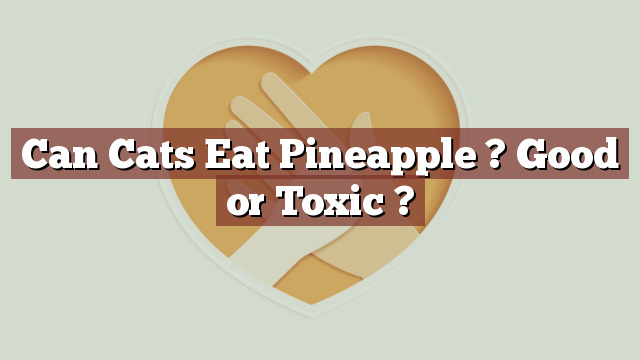Can Cats Eat Pineapple? Good or Toxic?
Knowing which foods are safe for our pets is crucial for their overall well-being. While cats have specific dietary needs, it is natural for pet owners to wonder if their feline friends can indulge in certain human foods, such as pineapple. In this article, we will explore the nutritional value of pineapple, discuss its safety for cats, and highlight any potential risks or benefits associated with feeding pineapple to our beloved feline companions.
Nutritional Value of Pineapple: Vitamins, Minerals, and Fiber
Pineapple is a tropical fruit that is well-known for its sweet and tangy taste. It is a rich source of various vitamins, including vitamin C, manganese, and vitamin B6. Additionally, pineapple contains essential minerals like copper, potassium, and magnesium. Furthermore, this delicious fruit is packed with dietary fiber, which aids in digestion and promotes a healthy gut.
Can Cats Eat Pineapple? Understanding Safety and Toxicity
Can cats eat pineapple? While pineapple is not toxic to cats, it is important to remember that felines have different dietary requirements than humans. The primary diet of cats should consist of high-quality cat food that meets their specific nutritional needs. Cats are obligate carnivores, which means they require a diet primarily composed of animal protein. Pineapple, being a fruit, does not provide the necessary nutrients that cats need for optimal health. Therefore, it is best to limit or avoid feeding pineapple to your cat.
According to veterinary experts, pineapple is generally safe for cats in small quantities. However, it is important to note that some cats may have digestive sensitivities or allergies to certain foods, including pineapple. If you do decide to offer your cat a small piece of pineapple, closely monitor their reaction and discontinue feeding it if any adverse symptoms, such as diarrhea or vomiting, occur.
Potential Risks and Benefits of Feeding Pineapple to Cats
Feeding pineapple to cats in moderation may have some potential benefits. The vitamin C content in pineapple can act as an antioxidant, supporting the immune system of your feline friend. Additionally, the fiber in pineapple may aid in digestion and prevent constipation. However, it is crucial to maintain a balanced diet for your cat, focusing primarily on their specific nutritional needs.
Despite some potential benefits, there are also risks associated with feeding pineapple to cats. The high sugar content in pineapple can lead to weight gain and potentially contribute to the development of health issues, such as diabetes or dental problems. Furthermore, excessive consumption of pineapple may cause gastrointestinal upset, as cats are not naturally inclined to digest large amounts of fruit.
What to Do If Your Cat Eats Pineapple: Monitoring and Care
If your cat accidentally consumes pineapple or you decide to offer them a small amount, it is important to closely monitor their behavior and overall health. Keep an eye out for any signs of digestive distress, such as diarrhea, vomiting, or changes in appetite. If any adverse symptoms persist or worsen, it is recommended to consult your veterinarian for further guidance.
Conclusion: Moderation is Key for Cats and Pineapple Consumption
In conclusion, while pineapple is not toxic to cats, it is not an essential part of their diet. Cats have unique nutritional needs that are best met through a balanced diet of high-quality cat food. Feeding pineapple to cats should be done in moderation and under close supervision. If you have any concerns or questions regarding your cat’s diet, it is always best to consult with a veterinarian who can provide personalized advice based on your cat’s specific needs.
Thank you for investing your time in exploring [page_title] on Can-Eat.org. Our goal is to provide readers like you with thorough and reliable information about various dietary topics. Each article, including [page_title], stems from diligent research and a passion for understanding the nuances of our food choices. We believe that knowledge is a vital step towards making informed and healthy decisions. However, while "[page_title]" sheds light on its specific topic, it's crucial to remember that everyone's body reacts differently to foods and dietary changes. What might be beneficial for one person could have different effects on another. Before you consider integrating suggestions or insights from "[page_title]" into your diet, it's always wise to consult with a nutritionist or healthcare professional. Their specialized knowledge ensures that you're making choices best suited to your individual health needs. As you navigate [page_title], be mindful of potential allergies, intolerances, or unique dietary requirements you may have. No singular article can capture the vast diversity of human health, and individualized guidance is invaluable. The content provided in [page_title] serves as a general guide. It is not, by any means, a substitute for personalized medical or nutritional advice. Your health should always be the top priority, and professional guidance is the best path forward. In your journey towards a balanced and nutritious lifestyle, we hope that [page_title] serves as a helpful stepping stone. Remember, informed decisions lead to healthier outcomes. Thank you for trusting Can-Eat.org. Continue exploring, learning, and prioritizing your health. Cheers to a well-informed and healthier future!

